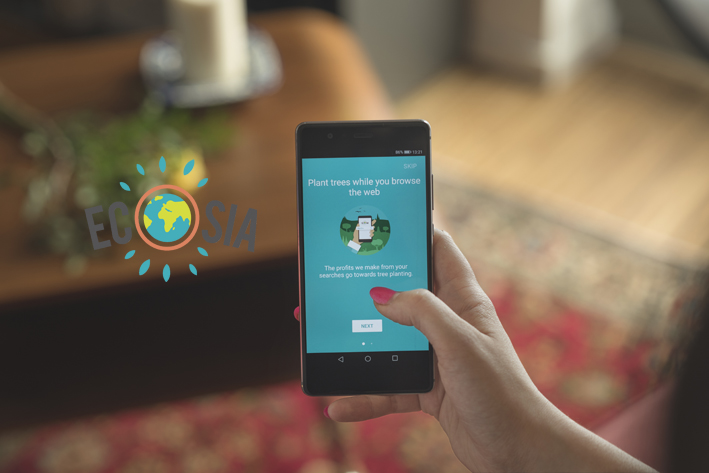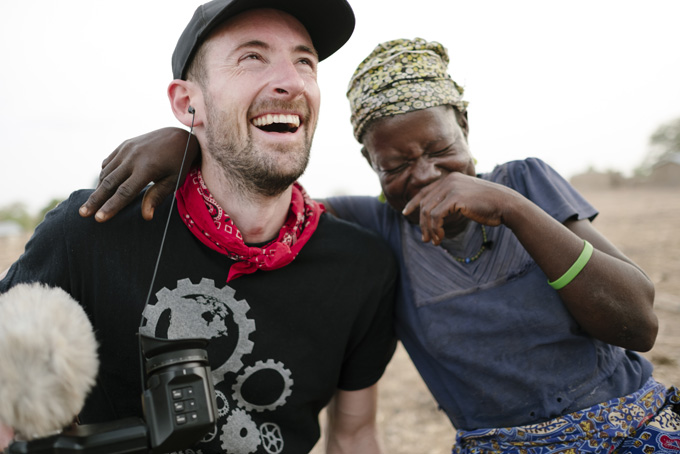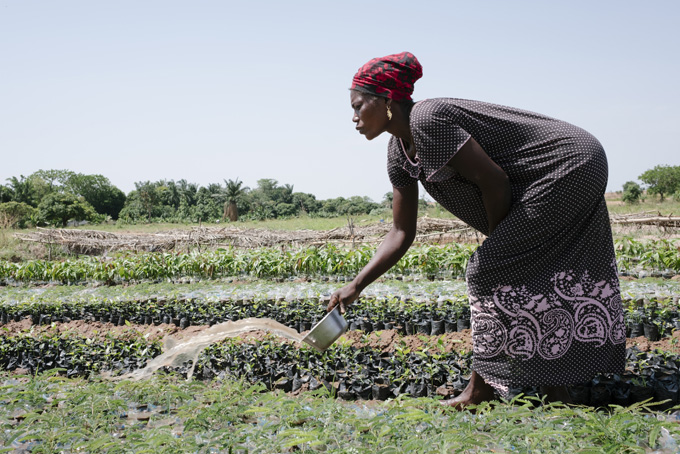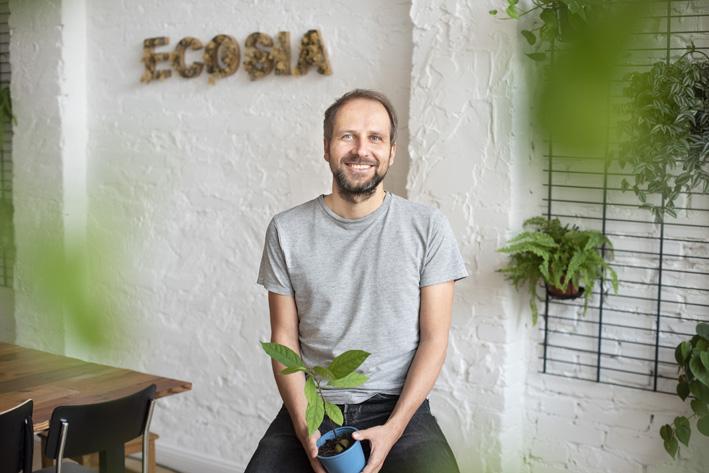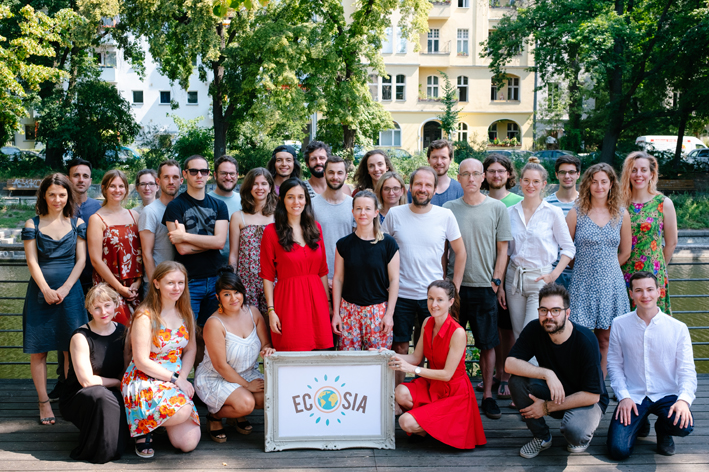Since 2009, Ecosia ranks among the alternative search engines compared to the giant Google. An eco-responsible search engine, the income generated by which funds reforestation projects and investments in renewable energies. Juliette Chabod, France’s Ecosia manager, explains to Feat-Y the digital company’s model, its objectives in terms of support for ecological programs around the world, notably in biodiversity conservation areas, and the reduction of its environmental impact. Interview.
Feat-Y: What is Ecosia’s business model?
Juliette Chabod: Ecosia operates the same way as every search engine. We generate money every time a user clicks on an ad. The major difference lies in the fact that the money we collect is donated to reforestation projects in critical biodiversity areas. Our model is a non-profit one. 80% of our revenue goes to fund these reforestation projects. The remaining 20% is used to finance investments in renewable energies, particularly in solar panels, to support local projects. For example, in France, we have supported the launch of permaculture farms. We are supporting several associations. We are committed to several environmental and social projects.
Feat-Y: Is Ecosia still linked to Bing, the Microsoft search engine?
J.C: Absolutely. We remain connected to them for several reasons. As any alternative search engine, we lack the team and the resources to compete with Google alone. Today, Ecosia counts 80 people for 15 million users. This is huge! We simply don’t have the strength to create our own algorithms. For this reason, Bing is our search partner. We are conscious of the need to improve our results, so we try to add little touches. The first thing we did was creating the green search. In other words, next to the search results, we index green sheets that highlight companies with environmental credentials, classified according to ecological labels. For example, the B Corp label. Or, companies that are going to be harmful to the planet are highlighted with a small factory icon and all these companies are companies that rely on fossil fuels. For example, a green leaf would be put next to Patagonia and next to Shell, you could have a little factory icon. We’re trying to help our users to increasingly make responsible choices. It begins with this first tool, and then gradually we’re hiring more staff to help us grow all of our development teams and provide a better and better product. I really hope one day we’ll just rely on our own algorithms and have our own results.
Feat-Y: What about the Ecosia algorithm? Is it designed to give priority to sites with a low ecological impact?
J.C: Well, it works with the green search. Advertisers are selected by Bing and they can choose an additional and alternative search engine like Ecosia, or even other such as DuckDuckGo or Qwant. Of course, we have less control over these advertisers. For this reason, putting forward companies that respect the planet was extremely important to us, with this tool.
Feat-Y: As an ecological search engine, what is the environmental impact of Ecosia and what investments are planned to reduce it?
J.C: You need to know we have a duty to act as, as a digital company, we do have a carbon footprint. Numerical technology causes huge pollution and it’ s getting worse and worse. People don’t really realize it – sending an email, making a video call – but the environmental cost is significant. It is hard to realize that behind everything is stocked in servers requiring power.
We invested in solar panels in 2017. At first, we were producing 100% of the energy that was needed to power our users’ searches. In 2019, we realized that we could produce double the energy. By 2020, we’ve actually generated three times as much. We compensate with these solar panels. The excess energy is invested in local circuits, in Germany. However, there is a real awareness of our environmental impact. We must compensate by various means. Also, we are very careful in the way our trees are used. For us, the trees must not be used for carbon offsetting. Our trees are there to regenerate the ecosystems, for a positive dimension and not for compensation logics.
Feat-Y: Today, do you know the number of users of Ecosia as a search engine and the percentage of French users?
J.C: Actually, we reach 15 million active users per month. In France, we currently have four million. France is the second market, behind Germany, at five million. We are followed by England and the United States. Paris is the city with the highest number of searches in the world.
Feat-Y: The reason for Ecosia’s fame is the fact that you finance reforestation programs via your search engine. Could you tell us how many trees have been planted via Ecosia and if the planting has accelerated in the last few years, including since the beginning of the health crisis?
J.C: To date, we have planted more than 127 million trees at 10,000 sites in 35 countries. We have experienced a pretty exponential growth since 2019. Lots went on in that year. I mean, there were forest fires in the Amazon. It’ s times you hear about Greta Thunberg, movements like Fridays for future, etc. As a result, we saw a strong commitment by young people, in particular, and above all a deployment of individual action. We noticed an increase in our user base at this moment, meaning more trees were planted. The crisis also had an effect, since people stayed at home more and carried out more research. This being said, advertisers had less money to allocate, to invest in search engines. Less ads but more searches.
Feat-Y: Do Ecosia support any other green programs? And if so, in comparison to the reforestation programs, what is their share?
J.C: Well, it really depends on the country. There are basically four markets. We have France, England, Germany and the United States. In France, we supported a permaculture project called “la ferme des Gonnegirls”, based in Normandy, we”ve supported in 2019. In England, during the whole Covid crisis, we came to set up reforestation projects in hospitals to support NHS hospital staff because evidence shows that there is a link between the presence of nature and the reduction of anxiety, improvement of mental health. For us, it was important to be present during this crisis. In Germany, we purchased a forest project to protect an environment where deforestation could have occurred. We have numerous different projects. At the moment, because of the crisis, we are working to protect our reforestation projects. We have very few of them in operation. I wish in 2022, we could resume this associative support in addition to our projects.
Feat-Y: Which geographical areas are the most important for Ecosia’s ecological programs and what are the criteria to obtain financial support from your company?
J.C: We act mainly in what we call critical biodiversity areas. In other words, areas where climate change is an emergency. This is why we do not have any projects in France. We operate in 35 countries. We have lots of projects in South America, especially in Brazil and Peru. In Africa, the continent with the most projects, we are present in Burkina Faso, Senegal and Ethiopia. We’ re also present in Southeast Asia, particularly in Indonesia. Since January 2020, we started working in Australia, following the forest fires at the beginning of that year, as we were not present in the region and we realized the emergency linked to natural disasters in Australia. We launched our projects there. In every country, we focused on specific actions. We are working with associations from local communities, because they are the most likely to ensure that we work with endemic species. The aim of these actions has never been to plant the same tree everywhere, but to work with the right species in the right place, to maintain biodiversity and ensure the resilience of ecosystems. Second, the question of ensuring a positive impact on local communities. In Senegal, for example, there is a food security issue. We are working with farmers through agroforestry methods to make the soil even more resilient, to allow them to diversify their crops and to increase their income. In Australia, we are working to counter the effects of climate change. In Uganda, we are working to preserve chimpanzees with the Jane Goodal Institute. In Brazil, we are fighting against deforestation in general, against regional deforestation policies. Also, Brazil represents 60% of the world’s biodiversity. This is significant. Each place is unique. This explains why we always proclaim the message: ” It’ s not simply a matter to plant a tree “. We need to understand the terrain. When recruiting associations, we make sure we’ re working only with people able to plant trees. When we arrive, we do not only ask to plant 10 trees, but hundreds of thousands over several years. A lot of follow-up is done on the plantings. It is necessary that the people involved have the capacity to regularly monitor the plantations because we can’t be everywhere at the same time and we try to avoid traveling as much as possible. We also make sure that they work with endemic species, have a real socio-economic understanding, respect women’s rights and do not hire children. We conduct research to ensure that these organizations are in line with Ecosia’s values and we try, as much as possible, to work with the same partners. For example, in Brazil, we have been working with the same partners since 2012. We try to establish as much as possible trustworthy relationships with people, and have long-term relationships.
Feat-Y: Has the current health crisis opened a reflection on the part of Ecosia to reconcile as much as possible the preservation of the environment and the respect of privacy?
J.C: Privacy is a real issue. We strongly believe in it. We don’t emphasize this message as much as the environmental one because, for us, it’s a basic requirement for a digital company to respect the privacy of its users. Especially in a world becoming more and more digitalized. Knowing that you are being monitored is never pleasant. I believe it to be very important. And on the environment, we are all aware of what is happening, the danger of the situation. I think these are both current struggles that dominate the media landscape. We try to reconcile these two things, doing the right thing, contributing to a better world for tomorrow, while respecting people’s privacy.
Interview by Jonathan Baudoin
infos:
